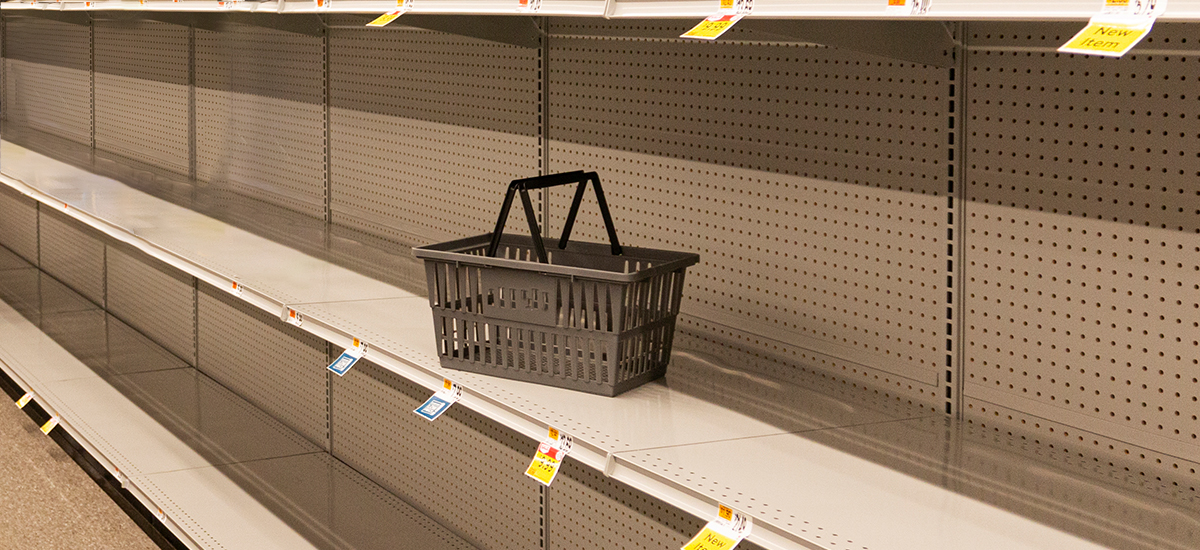The language of this website is controlled by the settings of your browser. You can select other languages via "Change"!
Food supply chains under pressure
A simple check shows that the topic of supply chain is currently attracting the greatest interest. Just enter the words "supply chain" and "food" in the search field of the search engine with the "G" and you will already get more than 900,000 search results (27th June 2022). And in top placement, on the first output page advised by SEO specialists by profession, for example the following sentences appear under the headline "similar questions", which were hardly of any importance before the pandemic and the Ukraine conflict: Will there be supply shortages of food? Which foods are affected by supply shortages? Which foods will no longer be supplied?

The effects of supply chains that do not run smoothly are clearly felt
But why is this topic on everyone's lips? There is not only emptiness on the sunflower oil shelf. Here often only single and rather the expensive bottles stand lonely in the shelf. Signs saying "currently out of stock" are increasingly be found on many shelves. Hoarding purchases of flour, yeast, paper kitchen towels or toilet paper, for example, are common practice. Retailers have already reacted with drastic quantity restrictions on purchases. Conditions that have almost become the norm since March 2020. However, due to the Ukraine conflict and the justified trade embargoes imposed by the EU on foreign trade, it is becoming increasingly complex to maintain a secure flow of goods. The consequences affect customers as well as the entire food and logistics industry: additional cost burdens and capacity shortages increasingly determine the agenda. The impact of pandemic-related restrictions in China is also still causing significant delays in the production and clearance of goods, disrupting globally aligned supply chains. High purchase prices, longer lead times and increased planning efforts are often the result, creating significant challenges for companies. Food manufacturers, retailers and logistics providers are confronted with high energy and raw material costs, which increases the costs for production and logistics and also leads to various price increases for consumers. In addition to rising prices for electricity, gas and diesel, the scarcity of many raw materials is also having a noticeable impact on supply chains as well as consumers' wallets. There are also increasing shortages of, for example, cardboard packaging, films, labels, wood and pallets, as well as storage space in warehouses. Alfred Miller, Managing Director of DACHSER Food Logistics, says: "We are currently seeing an increase in demand for warehouse capacity. Customers are expanding their inventories, which means that temporarily there is hardly any storage space available for seasonal business, for example." Miller also makes it clear that the consequences of the Ukraine conflict are also reflected in rising pallet prices and a shortage of loading space.
Bottlenecks and driver shortages create further tension within the supply chain
However, transport problems and disruptions in supply chains can also be attributed to the general lack of free container capacity, in particular refrigerated containers (suitable for transporting temperature-controlled foodstuffs), as well as the lack of freight capacity on ships and bottlenecks in ports. Global congestion and delays in container shipping are currently impacting supply chains in German, Dutch and Belgian ports as well. There are already signs of problems with loading and unloading, as well as with the removal of goods by truck. Here, too, the shortage of drivers is a major reason why large transport volumes handled by truck can increasingly only be carried out under difficult conditions. There is currently a shortage of up to 80,000 drivers in Germany and around 400,000 across Europe, in many cases due to pay, the poor image of the profession, unattractive working hours and poor general conditions such as overcrowded roads, poor sanitary facilities and a lack of parking spaces. The impact of the driver shortage is severe not only for logistics companies, but also for the entire food industry and the safety of supply chains. Karlkristian Dischinger, managing partner of the karldischinger gruppe and founding member of the European Food Network, comments: "Unfortunately, we have already been unable to submit offers for some customer inquiries because we had too few drivers available. But we have been aware of the problem of driver shortage for years. For a long time now, we have been increasingly recruiting drivers throughout Europe, with a focus on the East, providing them and their families with adequate accommodation, paying them German salaries from day one, helping them to learn the German language as quickly as possible, and conducting appropriate technical training courses in order to get the shortage under control as quickly as possible. Due to the current situation, we are once again massively stepping up these activities."
How do companies respond to raw material shortages and supply bottlenecks?
To meet the challenges, companies have so far implemented the following measures in particular: Price increases, expansion of the supplier network, increase in warehousing, personnel adjustments and relocation of production to other locations. The topics of digitization and automation of processes are being driven forward with great power. The objective of becoming climate-neutral - for example, by saving CO2 emissions - is also changing the interaction between the customer and the logistics partner and has a major influence on the future design of supply chains.
Establishment of a new partnership network in the supply chain
To avoid empty supermarket shelves in the future, many companies in the food industry need to rethink and restructure their supply chains. "A comprehensive networking approach is urgently needed to restructure supply chains. Supply chains can now only be maintained through partnerships that are sustainable," Alfred Miller affirms. This is because the quality required for the realization of supply chains does not arise in supply networks as the sum of the qualitative contributions of the individual companies involved, but rather from the active networking of all participants in a supply chain - from raw material suppliers, to manufacturers, to logistics providers, to retailers. New forms of organization, comprehensively digitized processes and employees with networking experience, as well as cross-supplier quality assurance, are indispensable for securing the flow of goods in the long term. Last but not least, sufficient warehouse capacities and CO2-neutral transportation as well as a forward-looking supply chain policy are essential.
"Challenges along the supply chain must be met together and in partnership."

Statement Peter Galliker, CEO Galliker Transport AG:
"The impact of the current supply chain issue on us as a company is manifold. And there is no end in sight, on the contrary. In recent months, the challenges and demands on logistics companies have increased further. Particularly in the area of delivery, the highest degree of flexibility is required from employees and in handling, especially from our warehouse experts, because a large proportion of incoming shipments are urgent. We are also observing that our customers are steadily increasing their storage capacities with us. As a result, we are increasingly able to provide less storage space. In order to still be able to meet as many customer requests as possible, our warehouse logistics specialists are constantly on the lookout for additional storage capabilities especially for temperature-controlled goods. Our current credo is: 'Keep your eyes open and react as quickly as possible when opportunities arise.' Because problems are piling up on all sides: Large volume fluctuations within a few days are also complicating our planning in the transport sector. Recipients are increasingly experiencing long waiting times because the unusually high volumes cannot be processed in the requested time. Images of containers piling up in ports all over the world are currently an integral part of the media. If our trucks then also have longer unloading times than intended for them, this leads to further delays for subsequent shipments."
Statement Till Bischoff, Spedition Heidelmann GmbH:
"We have to differentiate the effects of the current supply chain issue on our company: On the one hand, there are those that are noticeable in the procurement of our own working resources such as vehicles or IT equipment. Significantly increased planning effort is required to have the necessary operating resources in stock at the right time - if at all possible. In addition, we have significantly higher procurement costs in all areas. On the other hand, there are of course also effects on our services, which are largely linked to the procurement problems, but also to the general market situation - including shortages of skilled workers and available transport capacity. Where even before Corona and the war in Ukraine it was challenging to offer customers the desired flexibility in the face of capacity fluctuations throughout the year, it has now become almost impossible to respond to both planned and unplanned volume increases at short notice, as transport capacity and IT equipment cannot be procured in sufficient quantities in the short to medium term, and staff cannot be made available. In the end, there is even a risk that some customers will only be able to produce to a limited extent or, in the worst case, not at all due to shortages of raw materials (ingredients, cardboard boxes, pallets). As a countermeasure, we have to plan even more foresightedly than before, despite the simultaneous sharp increase in uncertainty: For example, where possible, we build up a larger stock of operating and working materials, for example IT equipment, in order to be able to compensate for failures and shortages as quickly as possible. For us as a service provider, it is essential to seek dialog with our customers, especially in this exceptional situation. We draw up customized demand and emergency plans together and at an early stage, as short-term solutions and reactions are becoming increasingly rare. Especially the bundled and very short-term occurrence of relevant issues such as lack of personnel resources, shortage of cargo space, lack of planning capability and the general shortage of certain material resources creates unprecedented challenges. These historic impairments along the entire supply chain, and specifically in our industry, can only be addressed together and in partnership."
In part two of the series "Food supply chains under pressure", you can read about the measures and strategies that Alfred Miller, Managing Director of DACHSER Food Logistics, is developing and driving forward in his company to secure the supply chain for his customers.
Do you want to contact us?
European Food Network
Christian Auchter
Senior Expert Corporate Public Relations
Tel.: +49 831 59161426
Mail: christian.auchter@dachser.com
Thomas-Dachser-Str. 2
87439 Kempten
Germany
Link notice
You are now leaving the European Food Network website and will be automatically redirected to the website .
Do you agree?

